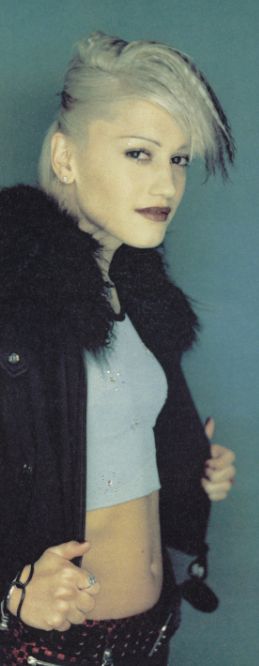New Again: No Doubt
In the movie Clueless, Alicia Silverstone as Cher Horowitz drives up to her Beverly Hills mansion with No Doubt’s “I’m Just a Girl” blasting from her stereo. The year was 1995, and Tragic Kingdom, which is actually No Doubt’s third album, had just been released. “Don’t Speak” was the break-up song du jour, “I’m Just A Girl” the girl-power anthem—a more accessible alternative to riot grrrl—and Gwen Stefani, the band’s lead singer, with bubblegum pink hair, an occasional bindi, and bare midriff, was something of a heroine.
No Doubt’s next album, The Return of Saturn (2000), was substantially less successful, and it wasn’t until Rock Steady (2001)’s reggae-infused dance rock that the band—and Gwen Stefani in particular—became superstars. Then came Stefani’s high-profile marriage to Bush frontman Gavin Rossdale; her tartan-dominated clothing line, L.A.M.B.; infectious, if entirely gimmicky and frivolous, solo career; and uniquely named children. It can be hard to recall the pretty, yet edgy, tomboy from Anaheim; today, Gwen Stefani is a celebrity of the People-magazine variety.
It’s been 11 years since No Doubt’s last album, the aforementioned Rock Steady, and the long time friends have finally reunited for a sixth album, Push and Shove, out at the end of September. Interview first spoke with Gwen Stefani, then a frank 26-year-old, in November 1996. While we wait for the release of Push and Shove, we thought we’d reprint the interview and revisit No Doubt’s glory days. —Emma Brown
Women Who Rock! Gwen Stefani, No Doubt
by Jill Kopelman
There’s a lot more to Gwen Stefani, the brassy 26-year-old lead singer of this year’s über-band, No Doubt, than platinum locks and a washboard stomach. An expressive lyricist, she has splashed her frustrations, heartbreaks, and ironically, even her doubts across the group’s phenomenal breakthrough album, Tragic Kingdom (Trauma/Interscope), which spawned the smash single, “Just a Girl.” A self-proclaimed “Goody Two-Shoes,” Stefani has emerged as one of the year’s most colorful pop personalities, singing in an unabashedly girlie voice that is now recognizable everywhere.
JILL KOPELMAN: So, you’re from California?
GWEN STEFANI: Yeah, Anaheim.
KOPELMAN: And you grew up with your brother, Eric, who’s in the band.
STEFANI: He used to be in it. Eric was the really talented and overly hyper older brother who was always pounding on the piano, and I was the lazy girl watching The Brady Bunch. I wasn’t doing anything, and he would say, “Come in here and sing with me!” I owe everything to him, and I learned how to write songs and how to be in a band because of him.
KOPELMAN: And then he let you go on your own.
STEFANI: Yeah. As soon as he left, a kind of creativity opened up for me. I think that’s why a lot of the songs on Tragic Kingdom are much more personal than on our previous record, because I wrote almost all the lyrics on this one.
KOPELMAN: The band’s already been going for nine years, right?
STEFANI: Yup, we started in ’87. I was 17 years old.
KOPELMAN: What did your parents think about that?
STEFANI: They were always saying, “You’re going to college, blah, blah, blah.” And we did. We all went to college up until the last semester. We were almost going to graduate, but since we’ve been touring this record, I don’t know [if we will].
KOPELMAN: Do you think the victory of having a hit is sweeter since you succeeded in a marathon and not a sprint?
STEFANI: We almost gave up about a year and a half ago. We were sitting there saying to ourselves, “O.K., we are 26. We’ve been doing this for eight years. Maybe we should finish up and get adult lives now.” Then the record came out and people thought it was good, which was really weird, because we were always the dork band from Anaheim. We never were cool enough or tough enough, because we grew up in Orange County with all those punk bands. We played with them but I always felt like Shirley Temple—just this little lollipop out there—and I could never have a really raspy or loud, screaming voice. We just never fit in. Plus, all the LA people looked down on us because we were from Orange County. We weren’t “cool.”
KOPELMAN: Why? Is there some sort of hierarchy of counties in California?
STEFANI: We would never write a song about anything “serious” because we’re not from LA with its whole “Under the Bridge” [a song by the Red Hot Chili Peppers] thing. It’s really fun now, though. People think we’re cool and want to be our friends. I’ll take it while I can.
KOPELMAN: When you were in school, you weren’t part of a cool crowd?
STEFANI: We had the jocks and the cheerleaders, and then the rockabillies, and the punkers, and the skankers, and the death rockers. I definitely was not in the cheerleader/jock crowd.
KOPELMAN: Did you fit into a category?
STEFANI: Yeah, I was a ska chick. We started out as a really hardcore ska band, only because we were trying to imitate the music that we loved. And we could barely play our instruments.
KOPELMAN: It must have been hard forming No Doubt out of high school?
STEFANI: The first thing Eric and I did was perform a song called “On My Radio” by Selector at a talent show. I held papers with the lyrics on them in my hand. At the start, we had another singer, John. In fact, he’s the one who got the band going, because he said, “I want to be in a band,” and he forced my brother to go get a keyboard. John’s the one who came up with our name.
KOPELMAN: Why did John leave?
STEPHANI: He committed suicide a year into the band. We’ve been through so many amazing times and so many tragedies…. We’d only been together for a year, but at the same time, when you are 17 and you work really hard on something, one year can seem like five.
KOPELMAN: How did you keep going after that?
STEFANI: We didn’t know what we wanted to do, but I guess everybody just loved making music so much that we decided that John would have wanted us to keep going.
KOPELMAN: Do you think anything is lacking in music today?
STEFANI: Well, I’m on such a high right now, it’s hard to be negative and say what’s missing. I think that right now is a really good period. For the longest time music was just so narrow. For instance, when I started in No Doubt there weren’t any garage-rock chicks, not in my area. If there was one, she would be the backup singer and I would be mesmerized by her.
KOPELMAN: Is it true that you make your own clothes?
STEFANI: I’ve always made stuff and there are so many disaster stories about my staying up all night trying to make something for a show the next day. I started doing it mostly because I move around so much onstage, so I have to find things that work with that. For example, I always have a way better show if I wear pants.
KOPELMAN: Really?
STEFANI: Yeah. You discover all these things after several years. I just said, “Forget it, I’m not wearing a dress anymore.” Fashion is an extension of your personality, and I’ve always been obsessed. I always want to have something different than everybody else.
THIS INTERVIEW INITIALLY APPEARED IN THE NOVEMBER 1996 ISSUE OF INTERVIEW.
For more New Again, click here.







